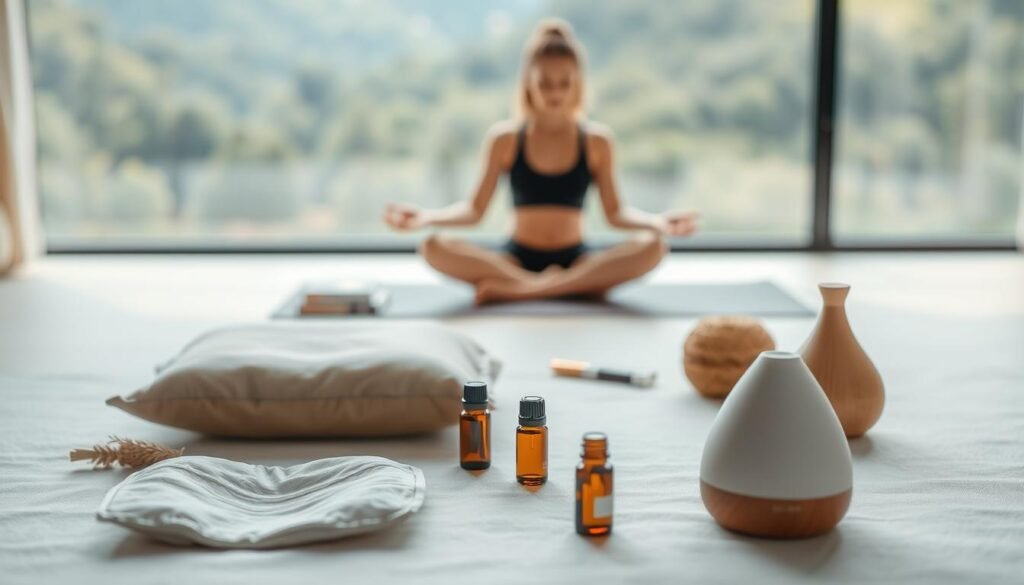Is your busy life hurting your self-care and physical health? Many think self-care is just a luxury. But ignoring basic habits like not sleeping enough or skipping meals can harm your health. Holistic self-care is essential for keeping your energy up, staying strong, and feeling good for a long time.
Key Takeaways
- Small daily actions shape your self-care physical health over time.
- Holistic self-care integrates nutrition, rest, and movement for total wellness.
- Ignoring stress harms both mental clarity and physical strength.
- Personalized routines adapt to your unique needs for sustainable progress.
- Proactive habits reduce risks of chronic issues and improve daily performance.
Understanding Self-Care and Its Importance
Self-care is more than just relaxing with a bath or a face mask. It’s about taking care of your body and mind every day. By focusing on self-care physical health, you can feel your best. Simple steps like exercising regularly or eating well are key to a healthy life.
Definition of Self-Care
Self-care means doing things that make you feel good. It covers three main areas:
- Physical: Nutrition, sleep, and movement
- Emotional: Managing stress and emotions
- Mental: Cognitive stimulation and mindfulness practices
The Role of Physical Health in Self-Care
Physical health is the base of well-being. Bad habits like bad diets or not moving enough can make you feel tired and sad. The CDC says 80% of U.S. adults don’t exercise enough, showing how important it is.
Good self-care tips for physical health include walking every day, stretching, or eating mindfully. These habits help you fight off diseases and feel better every day.
Benefits of Self-Care for Physical Health
Self-care strengthens the mind-body connection. This creates a cycle where physical health boosts mental clarity and emotional strength. By focusing on both, people see big changes in their daily lives.
Improved Mental Wellbeing
Exercise and mindful practices lower stress hormones like cortisol. They also increase endorphins, which fight anxiety and depression. This leads to sharper focus and emotional balance. Physical activity directly improves mental clarity.
Enhanced Physical Fitness
| Benefit | Explanation |
|---|---|
| Cardiovascular Health | Regular movement lowers blood pressure and heart disease risk. |
| Muscle Strength | Resistance training builds muscle mass, preventing age-related decline. |
| Immune Function | Consistent exercise boosts white blood cell activity, fighting infections. |
Increased Longevity
Research shows self-care physical health routines lead to longer lives. A 2020 Journal of Aging study found that regular exercise and healthy eating can delay chronic diseases by up to 15 years. Also, getting enough sleep and eating well slows down aging.
Key Components of Physical Self-Care
Physical self-care has three main parts: nutrition, exercise, and sleep. These are the basics of a healthy lifestyle. Making small changes in these areas can greatly improve your energy and health.
Nutrition and Diet
Eating well is key to your body’s health and energy. Focus on foods like leafy greens, lean proteins, and whole grains. Don’t skip meals to avoid eating too much later. Drink water instead of sugary drinks to stay hydrated.
- Read nutrition labels to avoid hidden sugars and sodium
- Incorporate fiber-rich foods to aid digestion
- Replace processed snacks with fruits or nuts
Regular Exercise
Even a little bit of movement is good. Activities like brisk walking, cycling, or stretching are great. The CDC suggests 150 minutes of moderate exercise a week. If you’re short on time, start with 10-minute sessions.
Sleep Hygiene
Good sleep is essential for your body’s repair and focus. Aim for 7-9 hours of sleep each night in a cool, dark room. Try to avoid screens an hour before bed to help your sleep. Going to bed and waking up at the same time every day helps your body’s clock.
- Use blackout curtains to block light
- Limit caffeine after noon
- Try calming routines like reading or deep breathing
Putting these practices together creates a cycle of wellness. Small changes in what you eat, how active you are, and how much you sleep can lead to big health improvements over time.
Creating a Personalized Self-Care Plan
Starting with self-care routines means knowing what you need. A plan that fits your life and goals is key. Here’s how to create a self-care plan that lasts.

Assessing Your Current Health
First, check your physical and mental health. Ask yourself:
- Do I feel tired all day?
- Is my sleep schedule regular?
- Could I eat better?
Get advice from doctors for your fitness or health needs.
Setting Realistic Goals
Use the SMART method for goals:
- Specific: “Exercise 3x weekly” is better than “get fit”
- Measurable: Use a fitness app to track steps
- Attainable: Begin with 15-minute walks
- Relevant: Pick activities you like
- Time-bound: Try to run a 5K in 3 months
Tracking Progress
Keep track of your progress with:
- Weekly mood journals
- Biometric trackers for sleep and activity
- Check your energy levels
Change your self-care techniques for wellbeing if needed to stay on track.
Incorporating Mindfulness into Self-Care
Mindfulness strengthens the mind-body connection, making it key to holistic self-care. It focuses on the present, linking mental and physical health. This creates a strong base for lasting health.
Benefits of Mindfulness Practices
Studies show mindfulness lowers stress hormones and inflammation. It also boosts immunity. Regular practice sharpens body awareness, helping spot health issues early.
- Reduces cortisol levels by 25-30% (per a 2022 study).
- Lower inflammation markers by up to 18% in 8 weeks of daily practice.
- Enhances immune response through stress reduction.
Techniques for Mindfulness
| Technique | Description | Physical Health Impact |
|---|---|---|
| Body Scan Meditation | Lie still, mentally scan each body part, noting sensations without judgment. | Improves posture awareness and muscle tension relief. |
| Mindful Movement | Yoga or tai chi with focus on breath and body alignment. | Boosts flexibility and injury prevention. |
| Mindful Eating | Eat slowly, savor flavors, and stop when full. | Promotes weight management and digestion. |
Mindfulness and Physical Health Connection
Practicing mindfulness trains your brain to notice physical signs like pain or fatigue early. This awareness lets you adjust routines before issues get worse. For instance, noticing shoulder tension might lead to stretching, preventing long-term strain.
This proactive approach fits well with holistic self-care. It addresses both mental and physical needs at the same time.
The Role of Nutrition in Self-Care
Nutrition is key to a healthy lifestyle. It shapes how you fuel your body every day. By choosing meals that fit your goals and health needs, you make a big impact on your well-being.
Understanding Nutritional Needs
Your body needs different nutrients to work well. For example:
- Proteins help muscles grow
- Whole grains give you energy
- Fruits and veggies are full of vitamins
Don’t follow fad diets. Talk to a registered dietitian to make a plan that’s right for you.
Meal Planning and Prep Tips
Being consistent is important. Here are some tips:
- Batch cooking: Cook grains and proteins for the week
- Use templates: Make meals with protein, veggies, and whole grains
- Keep it simple: Try sheet-pan dinners or stir-fries
Hydration and Its Importance
“Water is the body’s first defense against fatigue and poor focus,” says the National Institutes of Health.
Drink 8-10 cups of water a day, depending on how active you are. Carry a water bottle and add lemon or cucumber for taste. Use apps like MyFitnessPal to track your water intake.
Exercise Strategies for Enhanced Self-Care
Exercise is key to self-care, turning physical activity into a ritual for body and mind. To start, match your exercise to what you enjoy and your goals. This way, you’ll stick to it, making it a part of your wellness activities.
Finding the Right Type of Exercise
- Cardio: Running, cycling, or swimming boost heart health and mood.
- Strength Training: Resistance exercises build muscle and bone density.
- Flexibility Work: Yoga or Pilates improve mobility and mental calm.
- Recreational Activities: Dancing, hiking, or team sports add social and joyful elements.
Creating a Balanced Routine
A good routine mixes cardio, strength, and flexibility. Here’s a weekly plan:
- Monday: 30-minute brisk walk + stretching
- Wednesday: Yoga session + core exercises
- Friday: Team sport or dance class
- Weekends: Leisurely hikes or outdoor activities
Overcoming Common Barriers
Don’t have time? Begin with 10-minute bursts of activity. Struggling to stay motivated? Try exercising with music or podcasts. Have physical limitations? Talk to a trainer for adjustments. Every bit of exercise is a step toward better wellness activities.
Understanding Stress Management
Stress management is key to good self-care. Knowing how stress impacts your body and mind helps you control your health. This section offers practical steps to lower stress and protect your wellbeing.

Identifying Stressors
Begin by tracking your daily life to find what stresses you. Common stressors include work deadlines, money worries, and conflicts with others. Keep a journal to note when stress is high and look for patterns.
Stress-Reduction Techniques
Good self-care includes:
- Physical activity: Walks, yoga, or dancing to release tension
- Mindfulness: Daily meditation or breathing exercises
- Time management: Prioritizing tasks with planning tools
The Impact on Physical Health
Long-term stress harms your body. Here’s how stress affects different systems and how to manage it:
| Body System | Stress Impact | Management Strategy |
|---|---|---|
| Cardiovascular | Raised blood pressure | Aerobic exercise |
| Immune | Weakened defenses | Mindfulness practices |
| Digestive | Ulcers or IBS | Guided relaxation |
| Endocrine | Hormonal imbalance | Consistent sleep schedules |
Adding these strategies to your daily routine builds resilience against stress-related illnesses. Small, regular efforts lead to big benefits for your mind and body.
Building a Support Network for Self-Care
Self-care is more than just doing it alone. Having a strong support network helps you stick to your wellness goals. It makes sure your self-care plans stay up-to-date with life’s changes.
Importance of Community Support
Being part of a community boosts your health. Studies show it lowers stress and helps you stick to fitness plans. Joining group activities or workshops makes staying healthy fun and regular.
Even small actions, like sharing your progress with friends, can boost your motivation.
Finding Like-Minded Individuals
Look for groups that share your health goals. Local clubs, cooking classes, or online groups like Meetup are great places to meet people. Choose places where everyone works together, not against each other.
Sharing tips on healthy eating or mindfulness with others can make you more committed to your goals.
Professional Help: When to Seek It
Healthcare professionals, like dietitians or therapists, can give you personalized advice. If you’re struggling with stress, pain, or keeping a healthy diet, it’s time to seek help. Many clinics offer affordable options to help you.
Getting help early can stop small problems from becoming big ones.
Combining community support, professional advice, and self-care creates a complete health plan. Start by joining a local group or making an appointment. Small steps today lead to lasting health benefits. Don’t be afraid to ask for help along the way.



